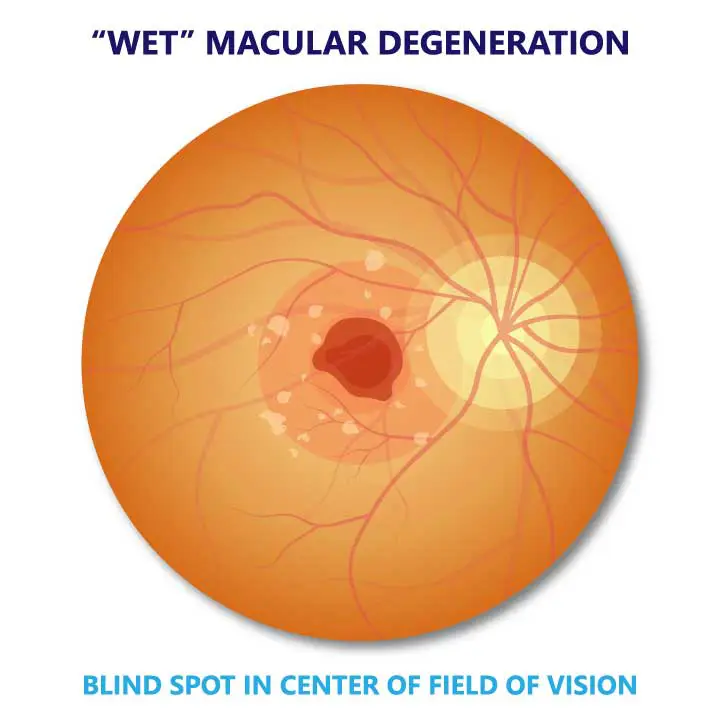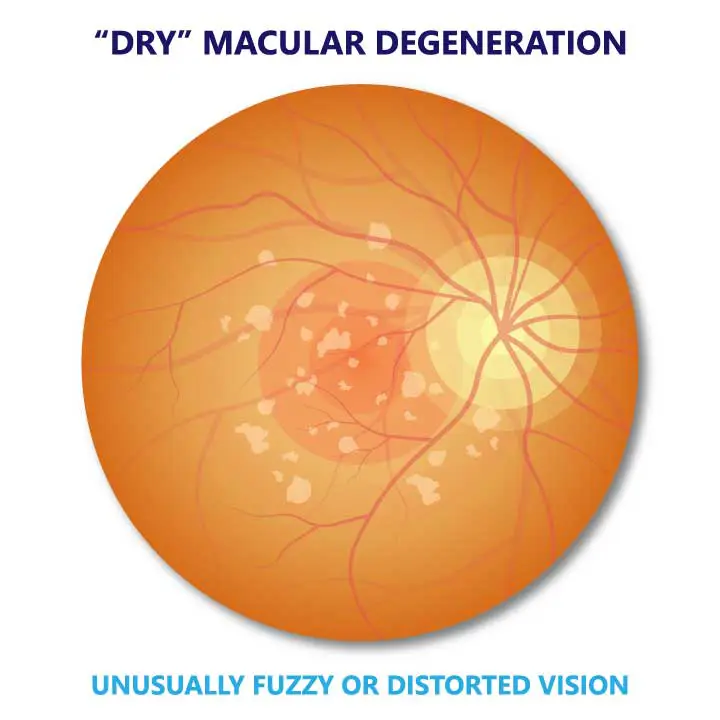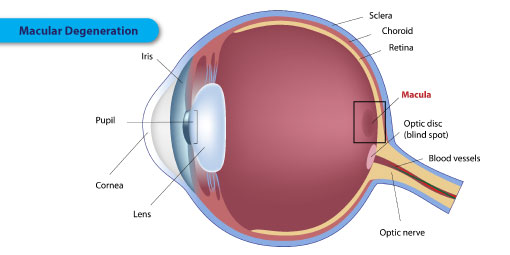Age-Related Macular Degeneration (AMD) - Symptoms, Causes and Treatment
07-04-2024
What is Age-Related Macular Degeneration (AMD)?
Age-Related Macular Degeneration (AMD) is a common eye condition that affects the macula, the small central portion of the retina at the back of the eye. The macula is responsible for sharp, central vision that allows us to see fine details clearly. As the name suggests, AMD is more likely to occur as we age and can result in a loss of central vision, making activities like reading and driving difficult. There are two types of AMD, dry and wet, with the wet form being more severe and potentially leading to rapid vision loss. Regular eye exams are important for early detection of AMD to help preserve vision and prevent further damage.

What Are The Causes Of Age-Related Macular Degeneration (AMD)?
Age-Related Macular Degeneration (AMD) is caused by a combination of genetic, environmental, and lifestyle factors. Research suggests that certain genes may make individuals more susceptible to developing AMD as they age. Additionally, factors such as smoking, poor diet, obesity, and prolonged exposure to sunlight may contribute to the development of AMD. Over time, these factors can lead to damage and deterioration of the macula, the central part of the retina responsible for sharp, central vision. Understanding the various causes of AMD can help individuals make informed choices to potentially reduce their risk of developing this condition.What Are The Risk Factors For Age-Related Macular Degeneration (AMD)?
Risk factors for Age-Related Macular Degeneration (AMD) include advancing age, family history of the disease, smoking, obesity, high blood pressure, and having light-colored eyes. Other risk factors include a diet high in saturated fats and low in fruits and vegetables, excessive exposure to sunlight, and cardiovascular disease. Additionally, individuals of European descent are at higher risk for developing AMD compared to other ethnicities. Regular eye exams are important for early detection and intervention in those at risk for AMD.What Are The Symptoms Of Age-Related Macular Degeneration (AMD)?
Symptoms of Age-Related Macular Degeneration (AMD) can vary depending on the type of AMD a person has. In the early stages, some individuals may not experience any noticeable symptoms. However, as the condition progresses, common symptoms can include blurry or distorted central vision, difficulty seeing fine details, dark spots or areas in the central vision, and changes in color perception. In some cases, individuals may also experience straight lines appearing wavy or crooked. These symptoms can make activities like reading, driving, and recognizing faces more challenging. It is important for individuals experiencing any of these symptoms to schedule a comprehensive eye exam with their optometrist for proper diagnosis and management.How is Age-Related Macular Degeneration (AMD) Diagnosed?
Age-Related Macular Degeneration (AMD) is diagnosed through a comprehensive eye exam, which includes a visual acuity test, dilated eye exam, and imaging tests such as optical coherence tomography (OCT) and fluorescein angiography. During the dilated eye exam, the optometrist will examine the back of the eye for any signs of AMD, including the presence of drusen or pigment changes in the macula. The imaging tests provide detailed images of the macula, allowing the optometrist to assess the extent of damage and monitor any changes over time. Early detection and monitoring of AMD are crucial in managing the condition and preventing further vision loss.How is Age-Related Macular Degeneration (AMD) Treated?
Age-Related Macular Degeneration (AMD) can be treated through a combination of lifestyle changes, dietary supplements, and medical interventions. One common treatment option is the use of anti-VEGF medications, which help to reduce the abnormal blood vessel growth that can contribute to AMD progression. Another treatment option is photodynamic therapy, which involves using a light-sensitive drug to target and destroy abnormal blood vessels in the eye. In some cases, laser therapy may also be used to seal off leaking blood vessels and prevent further vision loss. Additionally, some patients may benefit from low vision aids and devices to help improve their quality of life and manage any remaining vision loss. It is important for individuals with AMD to work closely with their optometrist to determine the most appropriate treatment plan for their specific condition.Is There A Cure For Age-Related Macular Degeneration (AMD)?
As an optometrist, I can confirm that there is currently no cure for Age-Related Macular Degeneration (AMD). While there are treatments available to help slow down the progression of the disease and preserve vision, there is no way to reverse the damage that has already occurred. Research is ongoing to find new and more effective treatments for AMD, but for now, the focus remains on managing the condition and preventing further vision loss. It is important for individuals with AMD to work closely with their eye care provider to monitor their condition and explore all available treatment options.How Can Age-Related Macular Degeneration (AMD) Be Prevented?
Age-Related Macular Degeneration (AMD) can be prevented through a combination of lifestyle changes and regular eye exams. Maintaining a healthy diet rich in antioxidants, vitamins, and minerals can help protect the eyes from damage caused by AMD. Additionally, wearing sunglasses to protect against harmful UV rays and quitting smoking can also reduce the risk of developing AMD. Regular eye exams are essential for early detection and treatment of AMD, as well as monitoring any changes in vision that may indicate the presence of the disease. By taking these preventive measures, individuals can help preserve their vision and reduce their risk of developing AMD.Regular eye exams with advanced technologies are essential for the early detection and treatment of age-related macular degeneration. Schedule an eye exam with an optometrist today!
Schedule An Appointment
Adult Eye Exams
Our advanced eye exams consist of 25+ modern tests and digital scans to assess eye health, function, and visual acuity.

Child Eye Exams
Give your child a clear future with an annual eye exam from our experienced Edmonton optometrists.

Senior Eye Exams
Maintain your vision through your golden years with gold standard eye care from the optometrists at our Edmonton eye clinic.

Contact Lens Eye Exams
Our eye exams for contact lens wearers include test and digital scans to assess eye health, function, visual acuity, and lens fit.

Diabetic Eye Exams
Managing diabetes requires regular eye exams to ensure that diabetes is not causing irreversible vision loss.

Dilated Eye Exams
Dilating the eyes enables our Edmonton optometrists to see more of the eye so that you many never see less.
Our Edmonton Eye Exams Are Comprised Of 4 Phases Of Evaluation

1. Eye Exam Pre-Testing
Corneal Thickness | Intraocular Pressures | Visual Field
Pre-testing is a detailed process that gathers all necessary information for the optometrist in advance of the optometrist-administered eye examination. This process involves completing a detailed patient history, as well as a series of standard tests. Pre-testing is an essential part of the comprehensive eye exam process, providing valuable information and visuals for both the optometrist and the patient.
More About Pre-Testing »
2. Advanced Diagnostic Testing
Retinal Photography, OCT, Topography
eye-deology Vision Care differentiates itself from other clinics by having the most advanced modern diagnostic specialty testing equipment. Specialty equipment, such as a wide-angle high-resolution retinal imager, Optical Coherence Tomography (OCT), Humphrey Visual Field Analyzer and corneal topographer, ensures that patients receive the best comprehensive eye care.
More About Advanced Testing »
3. Optometrist Examination
Health Assessment & Disease Diagnosis
eye-deology Vision Care Edmonton optometrists perform a multitude of tests and assessments to evaluate ocular health, eye coordination, and visual acuity. In addition, they also evaluate the results of the tests and scans performed during pre-testing. As part of patient education, our optometrists also take the time to show and explain results to patients.
More About Doctor Exam »
4. Eye Glass Consult
Prescription | Lens Selection | Digital Fitting
If you require corrective lenses to improve your vision, our licensed opticians will customize their fit to your unique attributes, needs, lifestyle, and budget. Our opticians are happy to provide you with information about the latest eyeglass frame and lens technologies available so you can make informed decisions and begin seeing and looking your best.
More About Eyewear Consult »